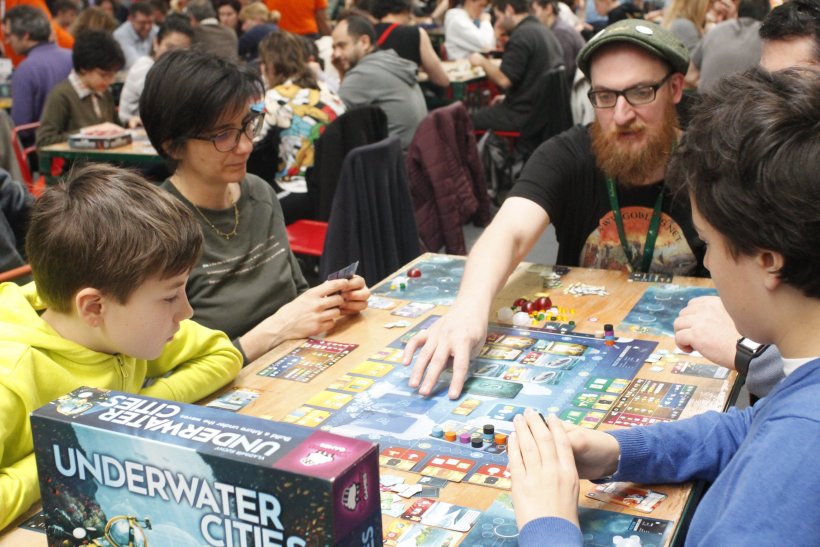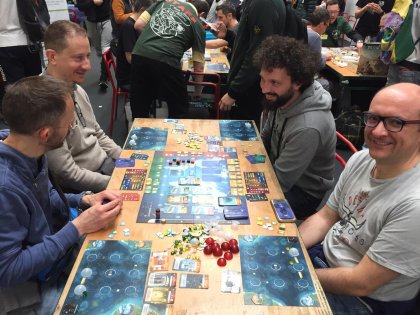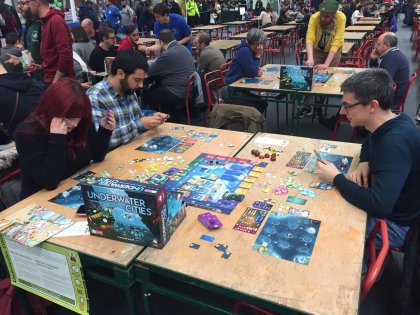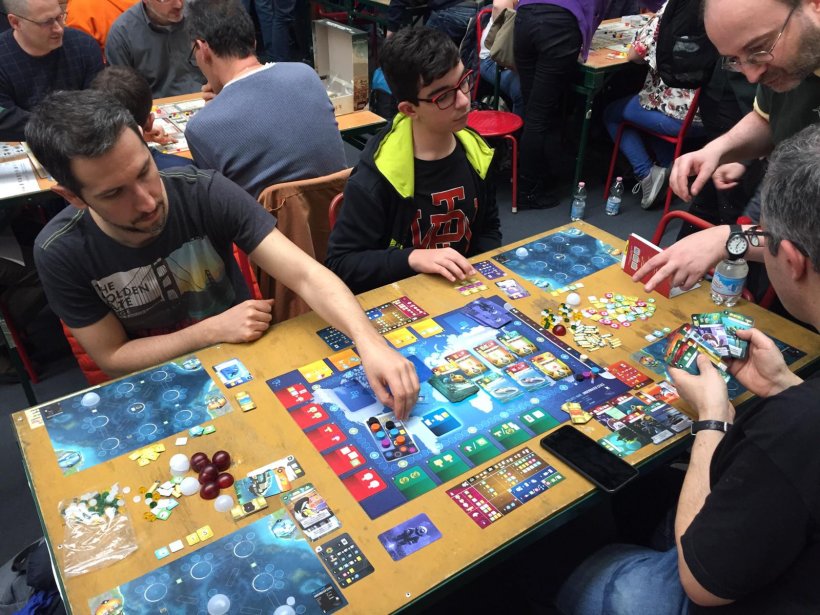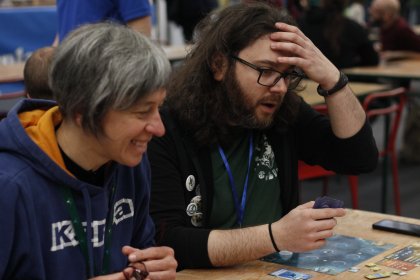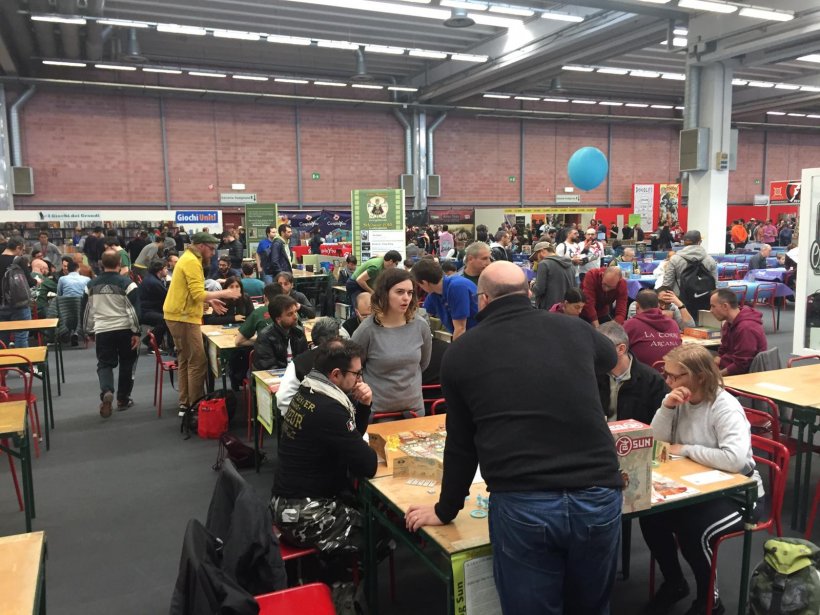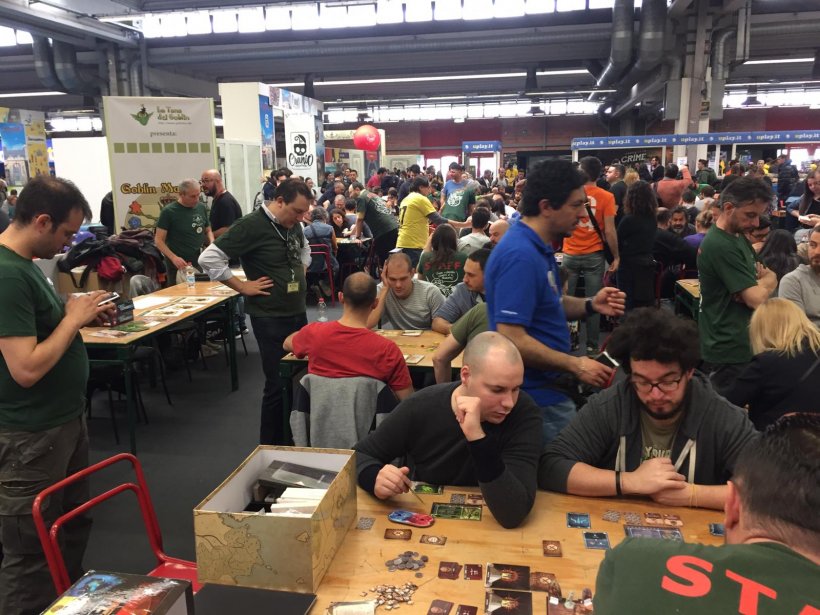Dieci domande a Vladimír Suchý
- 1. OK, siamo obbligati a fare questa domanda: il divorzio dalla CGE. È dovuto a una differenti opinioni sul game design o ad altro?
Come ho avuto modo di dire più volte, collaborare con la CGE è stata una fantastica esperienza, che mi ha soddisfatto appieno. Purtroppo mia moglie non è riuscita a trovare un lavoro soddisfacente dopo la maternità. Questo è il vero motivo che ci ha portato a creare una piccola casa editrice. La nostra casa editrice è, ora per mia moglie, lavoro a tempo pieno. Senza questa situazione io avrei continuato a collaborare con la CGE, probabilmente. Ad ora sono pienamente assorbito con gli impegni per la Delicious Games.
- Che differenze ci sono tra sviluppare e pubblicare un gioco da soli, rispetto ad appoggiarsi ad un editore?
Penso sia doveroso ricordare che ho ancora il mio lavoro „civile“, non legato ai boardgame. Chi fa il vero lavoro dell’editore è mia moglie. Io sono solo un autore per la Delicious Games. Non sono coinvolto negli aspetti di sviluppo più di quanto non lo fossi con la CGE. Come autore ho sempre collaborato con l’editore per alcuni cambi di produzione, oppure venivo invitato a risolvere dei problemi legati alla grafica, alle illustrazioni, ecc. Ora, in teoria, ho più responsabilità per i problemi di produzione.
- Lo scorso anno, con Pulsar, ci hai fornito una perfetta meccanica di gestione dadi. Quest’anno hai inventato il piazzamento carte. Pensi che un buon gioco debba sempre avere qualcosa di nuovo ed originale per essere un’eccellenza?
Ci sono un sacco di giochi che sono basati su un mix di meccaniche note. Anche questi giochi possono essere interessanti e divertenti. D’altro canto introdurre delle meccaniche originali nei nuovi giochi può renderli più appetibili e questi giochi hanno più possibilità di successo nel vasto mercato dei boardgame.
- Giocare in quattro comporta spesso un alto downtime. Lo hai riscontrato nei playtest? Pensi che si possa ridurre in qualche modo?
Nello sviluppo del prototipo è emerso questo aspetto, il gioco sembrava più fluido in meno di 4 giocatori. Ho dovuto scegliere se lasciare il gioco più complesso e lungo o se accorciarlo e renderlo più appetibile per quattro giocatori. Ho optato per il gioco complesso. D’altro canto conosco gente che preferisce giocarlo in 4.
- Alcuni paragonano Underwater Cities a Terraforming Mars, per l’utilizzo delle carte, la tematica scientifica, ed altro. Hai preso ispirazione da Terraforming Mars? Pensi siano simili in qualche aspetto?
In genere posso dire che durante lo sviluppo del gioco mi sono ispirato a vari giochi con le carte, che offrono varietà e divertimento. Tra questi posso citare Agricola, Race for the Galaxy, e a nche Terraforming Mars. Il primo pensiero è stato di sviluppare un gioco sul piazzamento lavoratori, nel quale ogni turno, inteso come ogni singola azione di piazzamento, sia unico. Abbinare differenti carte a differenti slot, assicura ogni volta azioni differenti.
- 6. Il gioco tende ad avere una bassa interazione, con ogni giocatore focalizzato sulla propria plancia e la propria città sottomarina. Pensi che questi giochi della categoria euro siano migliori con un’interazione bassa ed indiretta, lasciando ogni giocatore a sviluppare la propria strategia?
Non concordo col dire che “Underwater cities” sia più solitario di altri giochi…oltre a bloccare gli spazi azione e lottare per accaparrarsi le migliori carte speciali, c’è anche la lotta per l’ordine di turno. Penso che spesso si sorvoli su questo aspetto, ma è un forte elemento di interazione. D’altro canto preferisco i giochi dove non puoi distruggere o rubare rispetto a quelli che consentono questo tipo di interazione. Mi piace piuttosto competere con gli altri giocatori per costruire o sviluppare qualcosa di più grande, più velocemente, o migliore.
- Come hai bilanciato le carte a singolo utilizzo con quelle permanenti e le varie combinazioni del gioco?
E‘ stato bilanciato con il playtest, di solito stampo le carte simili su grandi fogli per poterle confrontare e dargli simile peso.
- Hai scelto di far pescare una singola carta a turno, invece di farla scegliere da un’offerta (per esempio). Pensi che questo renda il gioco prono ai colpi di fortuna?
Si, è possibile, perché‘ Underater Cities è, nei fatti, un gioco di carte, dove si acquisiscono molte carte casualmente. Ho sviluppato il gioco per gente che gradisce un certo livello di alea, che pone costantemente i giocatori di fronte a scelte. D’altro canto non possiamo dimenticarci del fatto che scegliere un’azione sul tabellone abbassa l’impatto dell‘alea.
- Hai giocato gli altri 7 giochi della nostra selezione (18Lilliput, Blackout: Hong Kong, Detective, Rising Sun, Root, Teotihuacan, Tokyo Metro, Underwater Cities)? Che ne pensi?
Della selezione ho provato Blackout Hong Kong e Teotihuacan.
Blackout mi è piaciuto molto alla prima partita.
Ho giocato più spesso a Teotihuacan e inizialmente mi è piaciuto; dopo un po‘ di partite non sono convinto di alcuni aspetti delle gioco.
- A cosa stai lavorando di nuovo? Raccontaci un po’ dei tuoi progetti futuri.
CI piacerebbe rilasciare per Essen 2019 l’espansione di Underwater CIties. Introduce nuove carte e degli elementi per aumentare l’interazione. Inoltre introdurremo degli elementi di asimmetria nella mano iniziale dei giocatori. La Delicius Games, inoltre, pubblicherà un mio piccolo gioco chiamato “Rescue Monsties”. SI può giocare con la famiglia o come filler, e dura circa 30 minuti. Oltre a questo sto cercando di sviluppare un nuovo giocone euro.
Intervista originale in Inglese
1) Ok, we must ask you this: the divorce from CGE. Was it due to different game design visions of what else?
As I said several times before, cooperation with CGE was great, I was very satisfied with that. CGE is company, where work only professionals and boardgame players. However, my wife didn’t find suitable job for her for a long time after her maternity leave. This is the only reason we found small family publishing company. Our company is fulltime job for my wife now. If this situation didn’t occur, it would be probable that I still cooperate with CGE. I found it interesting to work on some project with CGE, but now, I am fully busy with projects for Delicious Games.
2) Which are the differences between developing and producing a game all alone, compared to doing it for a publisher?
I tought to be mentioned that I still have my „civil“ job which is not connected with boardgames. The only publisher is my wife . I am still only Delicious Games author. In fact I am now drawn into more development matters than before when I cooperated with CGE. As an author I co-worked with Publisher on some production changes or was invited to solve some matters with graphics, illustrations etc. Now theoretically I have more responsibility for solving some production problems.
- Last year, with Pulsar 2049, you gave us a perfect mechanics of dice management. This year you invent this card placement. Do you think a good game must always have something new and original to be really an excellent one?
I mean, that there is a lot of boardgames, which are based on some new mix of already used mechanics. Even these games could be very interesting and enjoyable. On the other hand using original mechanics in new games could do them more attractive and these games have more chances for success in very wide amount of games on the „boardgame market“.
- Playing with four players results often in a high downtime game. Did you notice that during playtests? Do you think this aspect could be reduced someway?
While it was tested as a prototype I counted with this aspect, game seemed to be playable better in less than 4 players. It was the reason I needed to decide whether I should let gameflow to be more complex and long-time or to shorten it a little bit and make it more attractive for 4-player game, but not to be complex enough. I decided for full complexity of the game. On the other hand, I know people who like the 4-player game the most.
- Some people compare Underwater Cities to Terraforming Mars, for the use of the cards, for the scientific theme and so on. Did that game inspire you? And do you think they are similar in some aspects?
Generally during the development of the game I was inspired with more games where there is a lot of cards which offer enjoyable and variable gameflow. Among such games I would include Agricola, Race for Galaxy and Terraforming Mars too. Primordial thought was to develop game based on workplacement, in which every turn – understand every placement of worker - would be unique. Putting variable cards to differrent slots should ensure playing unique actions in player’s turn.
- The gameplay tends to have low interaction, with every player focused on his own game and underwater city. Do you think this kind of euro games are better with this kind of indirect and low interaction, leaving each player developing his own strategy?
I don’t agree with the meaning, that Underwater Cities are more „soliter“ than other games…..except blocking actions and fighting to have better special cards is also very important aspect of the player order, which is also the matter of struggle. I think that this fact is overlooked often but it is very strong interactive element. On the other hand I like games without any destroying or „stealing“ something somebody more than games with interaction of this type. I rather fight with other players in positive way by building or developing something bigger, better or nicer.
- How did you balance the distribution of one-use cards vs permanent cards and the various combos in the game?
It was balanced during play-testing. I also compared particular cards on very large printed sheets to have similar strenght.
- Drawing a random card each turn, insted of choosing it from a pool (for example). Do you think this kind of chance in this game could be too prone to luck for someone?
Yes, it is possible, because UC are in fact card game, where I gain a lot of cards randomly. I developer this game for people who like working with some level of randomness, which puts players in front of new choices permanently.
On the other hand we can’t forget, that choosing the action on the board which lowers the level of randomness is very important too.
- Did you play the other seven games in the selection (18Lilliput, Blackout: Hong Kong, Detective, Rising Sun, Root, Teotihuacan, Tokyo Metro, Underwater Cities)? What do you think about them?
From this nominated choice I played only Blackout: Hong Kong and Teotihuacan.
B:HK I liked for the first time a lot.
I played Teotihuacan more times, I liked it during our first games too, but now, after more and more games I am not sure about some elements of the game mechanics.
- What new games are you working on? Tell us something about your future projects.
We would like to release UC expansion for Essen 2019, which should contain new cards and parts which add to the game more interaction elements. Then it will include some asymmetric elements for the start of each player hand (game). Delicious Games are also publishing my new smaller game called „Rescue Monsties“. Playing this family (or filler) game lasts about 30 mins. It had very good references from families and players testing it. Beside these projects I am trying to work on bigger EURO for the future.



